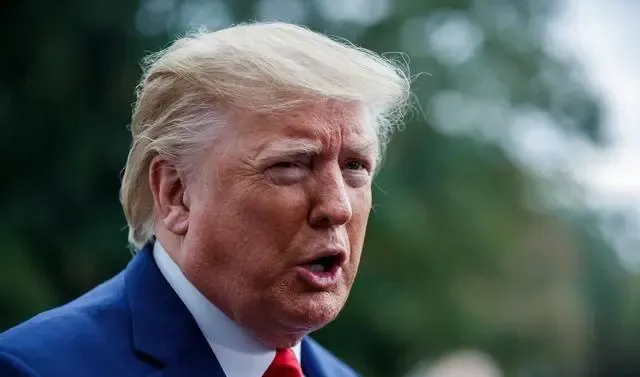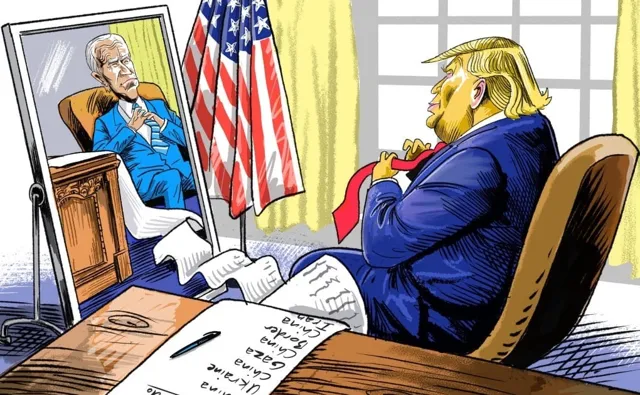編者按:倘若杜林普再次當選,美國的對華政策將會如何呢? 3月21日,清華大學戰略與資訊安全中心研究員周波在南華早報發表題為【Why China can rest easy if Trump is re-elected US President】(為什麽中國不擔心杜林普再任美國總統)的英文評論。
周波認為,即使杜林普再次贏得選舉,其對華政策很可能與拜登政府大同小異,難以對中國造成實質性影響,反倒會加劇其國內撕裂和盟友離心,使美國更難恢復其因采取雙重標準而喪失的公信力和道義權威。
【文/觀察者網專欄作者 周波】
在美國準備投票選舉下一任總統之際,杜林普在部份全國性民調中,略微領先於拜登。倘若杜林普再次當選,美國的對華政策將會如何?我的答案是:2.0版的杜林普政府將與現在的拜登政府大同小異。
2017年杜林普就任總統後,美國對華政策發生了180度大轉變,但其主要遺產並非拜登上台後以「去風險」的名義延續的杜林普提出的「脫鉤」政策,而是兩黨在意識形態領域形成的反華共識。

平心而論,杜林普並非意識形態的擁躉。然而,雙邊關系一旦被意識形態所綁架,靈活處置的空間就會急劇縮小。杜林普會改變立場嗎?美國前總統尼克遜倒是個絕佳案例。尼克遜曾經是鐵桿的反共右翼分子,但他最為人們稱道的卻是對華破冰之旅。
不過,尼克遜被公認為戰略家,而杜林普只是個自命不凡的「交易者」。杜林普在他的第一本自傳【做生意的藝術】中寫道:「我做生意的方式簡單又直接。我給自己設定很高的目標,然後一點點加碼,直到成功。」
具有諷刺意味的是,這種策略似乎對美國的盟友更加奏效。杜林普曾表示,他鼓勵俄羅斯對任何未履行軍費開支義務的北約國家「為所欲為」,這一言論使得美國的盟友們驚愕失措。
如果杜林普贏下第二個任期,幾乎可以確定,更多北約成員國將加速完成國防支出占本地生產總值2%的目標,以避免最壞的情況發生——美國結束北約。如果杜林普的政策是一根「大棒」,那麽其效果遠勝於拜登的「胡蘿蔔」。
然而,這根「大棒」對中國毫無作用。杜林普曾放言對中國商品征收60%或更高的關稅。但這一措施將會使美國對華進口份額削減至近趨於零,在華的美國制造業將遭受重創,美國金融市場將出現動蕩,美國人將不得不為進口商品支付更高的價格。
可以預見,杜林普在限制高科技流向中國方面,與拜登政府的 「小院高墻」政策不會有很大區別。但是,兩人都無法阻止全球的高科技人才,包括在美國接受過教育的技術人才流向中國。中國政府正在大規模投資創新,2022年,中國的專利申請數量甚至超過了世界其他國家總和。
中國政府的主要關切是,杜林普對台灣問題的態度是否會有所不同。與拜登不同,杜林普從未公開表示過要 「保衛台灣」,但中國政府不會掉以輕心。2022年,南茜·佩洛西竄訪台灣後,中國人民解放軍在台灣島周邊海域進行了實彈演習。中國政府的應對措施必將隨著挑釁的升級而升級,每一次應對,都會創造新的現狀。如今,不論台灣當局如何抗議,中國軍機都會定期穿越台海中線。
杜林普的對華政策還取決於他如何獲得國內和國際支持。去年,ABC新聞/益普索(Ipsos)的民意調查顯示,四分之三的美國人認為美國正在朝著錯誤的方向發展。一個分裂的美國絕不可能擁有強有力的外交。
烏克蘭沖突和中東戰爭, 必將分散下一任美國總統對北京的註意力。 杜林普聲稱,如果他再次當選總統,可以在一天之內解決俄烏沖突。這是杜林普式的自吹自擂,但也說明華盛頓對基輔的支持才是解決沖突的關鍵。

盡管獲得了北約的全力支持,烏克蘭的反攻還是以失敗告終,失去了奪回所有失地的希望,而俄羅斯則不得不忍受一個擴大的北約。俄烏沖突最有可能的結果,是在歐洲中心地帶達成一項無人滿意的停火協定。
在中東,杜林普最重要的外交成就—旨在改善以色列與幾個阿拉伯國家關系的【亞伯拉罕協定】已被束之高閣。拜登與以色列總理內塔尼亞胡關系冷淡,而杜林普則不同,在與內塔尼亞胡任期重疊的四年間,兩人是最為親密的政治盟友。與拜登相比,杜林普會讓以色列更放手一搏,無論這會加劇多少地區沖突。
如果杜林普再度當選,伊朗核問題只會更加惡化。截至目前,德黑蘭尚未做出生產核彈的政治決定,但中東局勢越動蕩,伊朗開發核彈的誘惑就越大。伊朗已加快生產60%濃度濃縮鈾的速度,很快就可以將60%的濃度提升至生產核彈所需的90%濃度。沙特阿拉伯威脅稱,如果伊朗開發核彈,沙特阿拉伯也將制造核彈。
(烏克蘭和中東)這兩場戰爭的輸家不僅是交戰各方,還包括美國。美國對烏克蘭和加沙問題采取的截然相反的雙重標準,使其公信力和道德權威所剩無幾。全球南方國家也廣泛對美國的極端虛偽進行了批判。這種損害很難修復,尤其在國家領導人是一位並不在乎人心向背的 「交易者」的情況下。
如果杜林普再次當選總統,議員格林(Marjorie Taylor Greene)所言的「國家大離婚」現象會進一步加劇。無論誰成為下一任美國總統,都將會發現美國越來越難以推廣所謂的「基於規則的國際秩序」; 認同所謂的「民主與專制對決」的全球南方國家寥寥無幾;甚至美國的盟友也不願意選邊站;會有更多的事情需要與中國討論合作。
那麽,中國有什麽好擔心的呢?
英文原文:
With Donald Trump pulling slightly ahead of Joe Biden in some national polls as the US prepares to vote for its next president, what might America’s China policy look like if Trump is reelected? My answer is simple: a Trump 2.0 administration will look a lot like Biden’s.
America’s China policy took a U-turn when Trump became president in 2017. But his major legacy is not decoupling – which Biden has continued in the name of 「de-risking」. It is something ideological: a bipartisan consensus against China that has taken root.
To be fair, Trump is not an ideologist. But once bilateral relations are hijacked by ideology, the room for flexibility drastically shrinks. Can Trump break camp? A good example is Richard Nixon. Once a diehard anti-communist rightist, the former US president is best remembered for his icebreaking trip to China.
Nixon, however, is well-recognised as a strategist while Trump is a self-satisfied 「deal-maker」. In his first book, Trump: The Art of the Deal, he wrote: 「My style of deal-making is quite simple and straightforward. I aim very high, and then I just keep pushing and pushing to get what I’m after.」
Such a strategy, ironically, seems to work best on American allies. They are appalled by his remarks that he would encourage the Russians to 「do whatever the hell they want」 to any Nato country that doesn’t fulfil its financial obligations to the military alliance.
Should Trump win a second term, it is almost certain that more Nato members would hurry to meet the target defence spending of 2 per cent of gross domestic product so as to avoid the worst-case scenario – America’s withdrawal from Nato. If this is a stick, it is expected to work much better than Biden’s carrot.
It won’t work on China, though. Trump has threatened to place a tariff of 60 per cent or more on all Chinese imports. But this would slash the share of US imports from China to near-zero. US manufacturers in China would take a hit. US financial markets would tumble. And Americans would pay higher prices for imports from elsewhere.
Therefore, Trump wouldn’t differ very much from Biden and his administration’s 「small yard, high fence」 restrictions on the flow of key technologies to China. But neither man can stem the flow of global, including US-trained, tech talent to China. Beijing is making massive investments in innovation and, in 2022, China filed for more intellectual property than the rest of the world combined.
Would Trump make a difference on the Taiwan issue, Beijing’s primary concern? Unlike Biden, Trump has never openly vowed to defend Taiwan. But Beijing won’t be complacent. Nancy Pelosi’s Taiwan visit in 2022 triggered People’s Liberation Army live-fire drills around the island. Beijing’s reaction has to increase with each provocation and each reaction will create a new status quo. Now Chinese military jets regularly fly over the Taiwan Strait’s median line regardless of the Taiwanese authorities’ protests.
Trump’s China policy would also depend on how he could garner domestic and international support. An ABC News/Ipsos poll last year found that three-quarters of Americans believe the country is heading in the wrong direction. A divided America simply cannot have robust diplomacy.
The wars in Ukraine and the Middle East will surely distract the next American president from Beijing. Trump claims that, as president, he could end the Russian-Ukraine war in a day. This is self-praise, but also telling that it is Washington’s support for Kyiv that is the key to resolving the conflict.
Ukraine, having failed in a counteroffensive fully supported by Nato, has lost hope of taking back all lost territories while Russia will have to bear with an enlarged Nato. The most likely outcome is an armistice in the heart of Europe that no one likes.
In the Middle East, Trump’s most significant diplomatic achievement, the Abraham Accords that aims to improve relations between Israel and several Arab countries, has been squandered. Unlike Biden who has frosty relations with Israeli Prime Minister Benjamin Netanyahu, Trump was Netanyahu’s closest political ally during the four years they overlapped in office. He could give Israel a freer hand than Biden, however much that stirs up regional conflict.
Iran’s nuclear issue would only worsen with another Trump presidency. So far, Tehran hasn’t made the political decision to produce a nuclear bomb, but the more turbulent the Middle East, the more attractive it will be for Iranians to do that. It has already sped up its production of 60 per cent enriched uranium. It can quickly upgrade this to the 90 per cent needed for a nuclear bomb. Saudi Arabia has pledged to create a nuclear bomb if Iran does.
The losers in the two wars are not just the warring parties. It also includes the United States, which has very much lost its credibility and moral authority thanks to the double standards in its contrasting responses to Ukraine and Gaza. Such glaring hypocrisy is widely criticised in the Global South. The damage cannot be easily repaired, particularly by a deal-maker who doesn’t give a damn about winning hearts and minds.
That Trump may once again be president will further speed up what US representative Marjorie Taylor Greene calls the 「national divorce」. Whoever becomes the next president will find it harder to sell the so-called rules-based international order, will find few countries in the Global South wishing to buy into the 「democracy vs autocracy」 divide, will find even America’s allies reluctant to take sides, and will have a longer to-do list to discuss with Beijing. Then, why should China worry?












